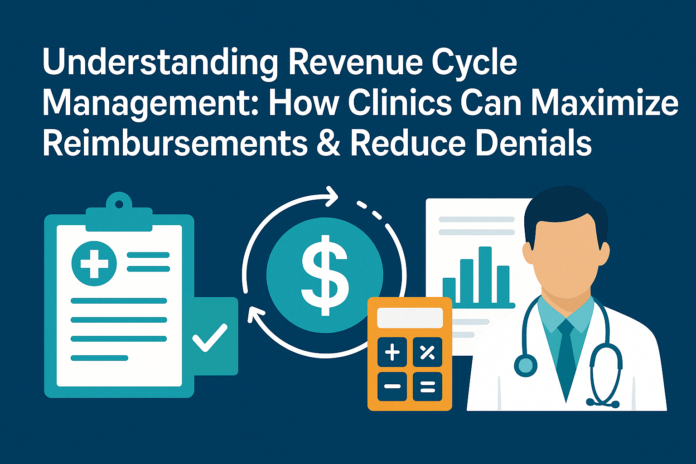Why Every Clinic Needs a Strong RCM Process
Revenue Cycle Management (RCM) is the financial backbone of any medical practice, ensuring that healthcare providers get paid for their services accurately and on time. Whether you run a small private practice or a large multi-specialty clinic, an efficient RCM system is critical for maintaining steady cash flow, minimizing claim denials, and reducing administrative burden.
In this comprehensive guide, we will break down what RCM is, how it works, key challenges, and best practices to help doctors, clinics, and healthcare providers optimize their revenue.
1. What Is Revenue Cycle Management (RCM)?
Revenue Cycle Management (RCM) is the end-to-end financial process of managing a patient’s healthcare journey from appointment scheduling to final payment collection.
RCM includes:
- Insurance verification & eligibility checks
- Medical coding & billing
- Claims submission & denial management
- Payment posting & patient collections
A well-structured RCM system ensures faster reimbursements, fewer billing errors, and improved financial health for healthcare providers.
2. The 7 Stages of Revenue Cycle Management
-
Patient Registration & Insurance Verification
Before a patient visits the clinic, their demographic details and insurance coverage are collected and verified.
This prevents claim denials due to invalid insurance or coverage limitations.
Tools like real-time eligibility verification improve efficiency.
-
Medical Coding & Charge Capture
Diagnoses and treatments are converted into standardized medical codes (ICD-10, CPT, HCPCS).
Accurate coding is crucial for correct reimbursements.
Mistakes in coding can lead to claim rejections or compliance penalties.
-
Claims Submission & Payer Processing
The coded medical bills are submitted to insurance companies (Medicare, Medicaid, private payers).
Using electronic claims submission (EDI) speeds up processing.
Common errors in claim submission include incorrect patient details, duplicate claims, or missing codes.
-
Claims Adjudication & Denial Management
Insurance companies evaluate submitted claims for accuracy, eligibility, and medical necessity.
Rejected claims must be corrected and resubmitted to avoid revenue loss.
A strong denial management process helps maximize approved claims.
-
Payment Posting & Reconciliation
Once a claim is approved, payments are posted in the system, and adjustments are made.
Anomalies like underpayments or payer discrepancies are flagged.
Regular reconciliation of accounts ensures that payments are correctly matched to services provided.
-
Patient Billing & Collections
If there’s a remaining balance, patients receive a bill statement.
Offering digital payment options improves collection rates.
Automated payment reminders can reduce unpaid balances.
-
Reporting & Performance Optimization
Clinics analyze billing reports, denial trends, and revenue metrics to identify areas for improvement.
Using RCM analytics tools helps in reducing delays and optimizing workflows.
3. Common Challenges in Revenue Cycle Management
Even with a well-defined RCM system, many clinics face financial challenges that impact their revenue:
- Claim Denials & Rejections – Around 15–25% of claims get denied due to coding errors, missing information, or insurance issues.
- Delayed Payments – Processing errors and inefficient billing systems cause cash flow problems.
- Increasing Patient Responsibility – With high-deductible health plans (HDHPs), patients owe more out-of-pocket costs, increasing the risk of non-payment.
- Compliance & Regulatory Issues – Failure to comply with HIPAA, Medicare rules, and payer guidelines can lead to penalties and revenue losses.
Solution: Investing in RCM automation, outsourcing billing services, and training staff can reduce claim errors and speed up payments.
4. Best Practices to Optimize RCM for Clinics & Private Practices
To improve collections and cash flow, healthcare providers should adopt these RCM best practices:
- Automate Eligibility Verification – Use real-time tools to check insurance status before services are rendered.
- Improve Documentation & Coding Accuracy – Train staff on ICD-10 and CPT codes to reduce claim denials.
- Leverage RCM Software & AI – AI-powered billing solutions streamline claims processing and reduce human errors.
- Monitor & Appeal Denied Claims Promptly – Set up an automated denial tracking system to resubmit claims quickly.
- Educate Patients About Billing & Payment Options – Offer online payment portals, installment plans, and automated reminders.
By following these proven RCM strategies, clinics can increase collections by 10-20% and reduce claim denials by up to 50%.
5. RCM Insights & Resources at ClinicBillingHelp.com
At ClinicBillingHelp.com, we provide in-depth articles, research-backed guides, and the latest industry updates to help doctors, medical practices, and clinics stay informed about Revenue Cycle Management (RCM) best practices.
- Comprehensive RCM Insights – Explore expert articles covering insurance verification, billing workflows, and patient collections.
- Industry Trends & Updates – Stay ahead with the latest Medicare changes, coding revisions, and payer policies.
- Billing & Coding Best Practices – Reduce claim denials and enhance reimbursement strategies with practical, easy-to-follow guides.
- Software Reviews & Comparisons – Discover leading RCM software and billing solutions to streamline your revenue processes.
Want to optimize your clinic’s financial workflow?
Explore our expert articles and RCM resources at ClinicBillingHelp.com.
Conclusion: Why RCM Matters for Every Healthcare Provider
Effective Revenue Cycle Management (RCM) is key to financial success for doctors, clinics, and healthcare providers. By streamlining billing, reducing claim denials, and optimizing collections, providers can increase revenue, minimize losses, and focus on patient care.
At ClinicBillingHelp.com, we help clinics navigate the complexities of medical billing and maximize reimbursements. Explore our expert RCM resources and solutions today!




